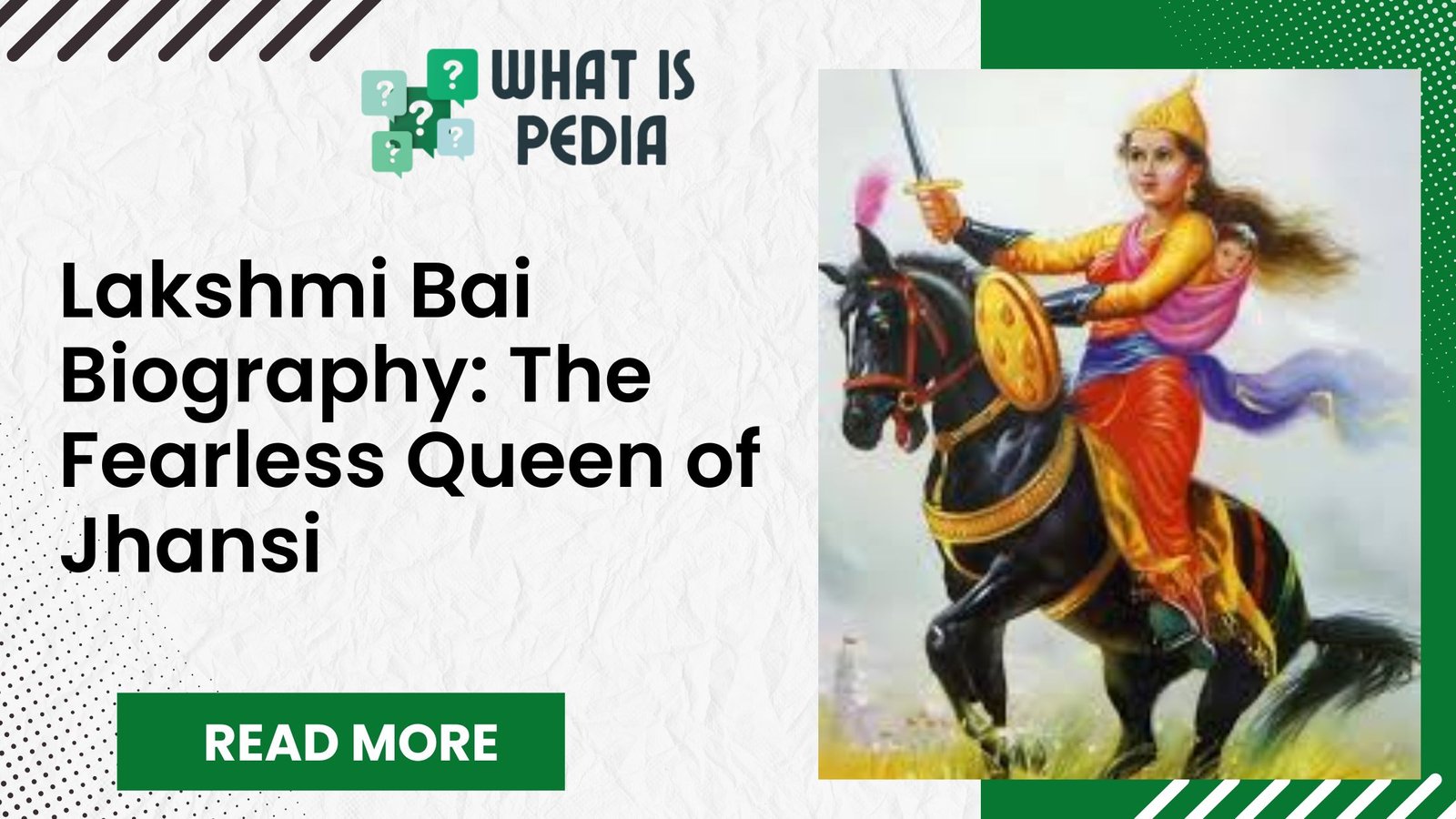1. Introduction
Rani Lakshmi Bai, the Queen of Jhansi, remains one of the most iconic figures in Indian history. Her unwavering bravery, patriotic spirit, and determination to protect her kingdom from British rule made her a symbol of resistance and women’s empowerment. Born during an era when women’s roles were confined to households, Lakshmi Bai broke societal norms and emerged as a fierce warrior and capable ruler.
Her life story is not just about battles but also about resilience, leadership, and sacrifice. From her early years in Varanasi to her last stand against the British forces in Gwalior, Lakshmi Bai left an indelible mark on India’s struggle for independence. Her famous words, “Main apni Jhansi nahi doongi!”, still echo as a testament to her fearless spirit.
This blog delves deep into the life of Lakshmi Bai, exploring her journey from childhood to martyrdom and the legacy she left behind.
2. Early Life and Background
Lakshmi Bai was born as Manikarnika Tambe on 19 November 1828, in Varanasi, Uttar Pradesh. Fondly called “Manu” by her family, she was the daughter of Moropant Tambe, a court official in the service of the Peshwa of Bithoor, and Bhagirathi Sapre, a cultured and religious woman.
Unlike most girls of her time, Lakshmi Bai received an unconventional upbringing. Under her father’s guidance, she was trained in martial arts, horse riding, sword fighting, and archery. She also received a formal education, learning Sanskrit, Marathi, and Persian. The Peshwa of Bithoor treated her like his own daughter, often calling her “Chhabili” for her playful and lively nature.
Her childhood experiences shaped her strong personality. Exposure to military training, combined with the cultural and political environment of the Peshwa’s court, instilled in Lakshmi Bai the qualities of leadership, resilience, and patriotism.
3. Marriage and Life in Jhansi
In 1842, at the age of 14, Manikarnika married Maharaja Gangadhar Rao Newalkar, the ruler of Jhansi. After marriage, she was renamed Lakshmi Bai, symbolizing her role as the queen and the strength she would bring to the kingdom.
As the Queen of Jhansi, Lakshmi Bai was not confined to the palace. She actively participated in administrative affairs, promoted education, and encouraged social reforms. Her dedication to the welfare of her people earned her immense respect among the citizens of Jhansi.
In 1851, she gave birth to a son named Damodar Rao, but fate dealt her a cruel blow when the child passed away at just four months old. To secure the lineage, Lakshmi Bai and Gangadhar Rao adopted Anand Rao, a distant relative, renaming him Damodar Rao.
Tragedy struck again in 1853 when Maharaja Gangadhar Rao passed away. This personal loss did not break her spirit but strengthened her resolve to protect Jhansi from external threats, especially the British.
4. Struggle Against British Rule
The British, under Lord Dalhousie’s Doctrine of Lapse, refused to recognize Damodar Rao as the rightful heir to the Jhansi throne. According to this policy, if a ruler died without a biological male heir, the kingdom would be annexed by the British.
Lakshmi Bai vehemently opposed this injustice, famously declaring, “Main apni Jhansi nahi doongi!” She petitioned the British authorities, but her appeals were rejected. Realizing that diplomatic efforts would not succeed, Lakshmi Bai began strengthening Jhansi’s defenses.
She formed an army that included both men and women. Women were trained in sword fighting, horse riding, and warfare, making Lakshmi Bai’s army one of the most unique in history. Her leadership and dedication inspired her people to stand firmly by her side.
5. Revolt of 1857 and Her Role
The Revolt of 1857, also known as the First War of Independence, was a turning point in Lakshmi Bai’s life. The revolt began as a mutiny among Indian soldiers in the British army but soon spread across the country.
When the uprising reached Jhansi, Lakshmi Bai assumed command of the rebel forces. She allied with prominent leaders like Tatya Tope and Nana Sahib to resist British expansion.
Key Battles Fought by Lakshmi Bai:
- Siege of Jhansi (March 1858):
- British forces, led by General Hugh Rose, laid siege to Jhansi.
- Lakshmi Bai defended the fort fiercely, leading her troops from the front.
- Despite her valiant efforts, the fort fell, but she escaped with her adopted son.
- Battle of Kalpi (May 1858):
- After fleeing Jhansi, Lakshmi Bai joined Tatya Tope and other rebels in Kalpi.
- Together, they fought against the British but faced defeat due to superior enemy firepower.
- Battle of Gwalior (June 1858):
- Lakshmi Bai and her allies captured the Gwalior fort.
- This victory was short-lived, as British forces soon launched a counterattack.
Lakshmi Bai’s leadership, courage, and military strategies earned her admiration even from her enemies. General Hugh Rose himself praised her as “the bravest and best of rebel leaders.”
6. Martyrdom and Legacy
On 18 June 1858, Lakshmi Bai fought her last battle near Gwalior. Dressed as a soldier, she led her troops into battle, displaying unmatched valor. While fighting fiercely, she was gravely wounded.
Realizing the end was near, she instructed her followers to burn her body to prevent it from falling into British hands. Lakshmi Bai died as she lived—fighting for her kingdom and her people.
Her sacrifice left a lasting impact on the Indian freedom struggle. Though the British regained control, Lakshmi Bai’s bravery inspired countless freedom fighters, including Bhagat Singh, Subhash Chandra Bose, and many others.
7. Lakshmi Bai’s Impact and Influence
Lakshmi Bai’s legacy transcends generations. She became a symbol of women’s empowerment and resistance against oppression. Her life has been celebrated in literature, films, plays, and folk songs.
Numerous memorials, including the Rani Lakshmi Bai Park in Jhansi and her statues across India, stand as reminders of her indomitable spirit. Schools, colleges, and institutions bear her name, reflecting the inspiration she continues to provide.
Her contribution to India’s struggle for independence also found recognition in Netaji Subhash Chandra Bose’s Rani of Jhansi Regiment, an all-female combat unit formed during World War II.
8. Conclusion
Rani Lakshmi Bai was not just a queen but a symbol of courage, patriotism, and resilience. From her early life in Varanasi to her heroic stand against British forces, her journey reflects the strength of the human spirit.
Her famous words, “Main apni Jhansi nahi doongi!”, remain etched in the hearts of Indians. Lakshmi Bai’s legacy continues to inspire women to break barriers and stand up for their rights.
Even today, she is remembered not just as a historical figure but as a timeless icon of bravery. Her life serves as a powerful reminder that true strength lies in courage, determination, and an unwavering commitment to justice.
For more inspiring stories of fearless women warriors, read about Rani Velu Nachiyar’s Biography, another remarkable queen who defied colonial rule with unmatched bravery.







